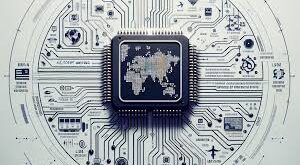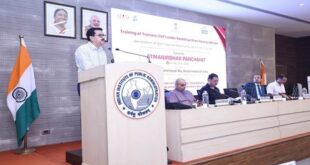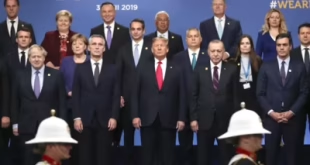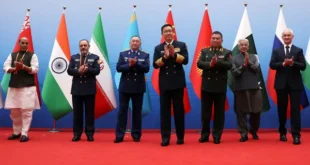- A recent statement by External Affairs Minister S. Jaishankar that India can play a “stabilising” and “bridging” role, at a time when the world no longer offers an “optimistic picture”, is intriguing.
- He stated that India can contribute towards the “de-risking of the global economy” and in political terms, “in some way, help depolarise the world”.
- He said, “I think those are really expectations that a lot of other countries, especially countries of the global south have of us. Obviously, we will try and do what we can, and we remain in touch with all the bottom countries of the world.
- ” He added, “Countries wanted to talk to us, because there is a belief that we are in touch with key players [and] we can influence them, we can shape the thinking, we can contribute, we are prepared, sometimes to say things which many others cannot see, or have reached out to countries and leaders in a way may not be possible for everybody to do so.”
- Jaishankar’s is an ambitious formulation expressed, wisely, in cautious terms. In 2012, when I wrote my book, Pax Indica: India and the World in the 21st Century, many immediately misconstrued the title phrase to mean world domination, as in the familiar “Pax Romana” or “Pax Britannica”.
- What I meant, however, was the critical role I believed India has to play in what has become a cooperative networked system in our multi-polar world. The idea of “Pax Indica”, to me, is not about India as a future “world leader” or even as “the next superpower”, a status assorted commentators claimed that it was heading irresistibly towards.
- Instead “Pax Indica”, in my conception, was about India’s role in shaping the emerging global “network” which would define international relations and world politics in the 21st century. I believe that the era of any country claiming or seeking to be a “world leader” is definitely over — and I hope Beijing is listening.
An archaic notion
- Much of the conventional analyses of any country’s stature in the world relies on the all-too-familiar economic and hard-power assumptions.
- But as India demonstrates daily, we are famously a land of paradoxes, and among those paradoxes is that so many speak about India as a great power of the 21st century when we are not yet able to feed, educate and employ all our people.
- So it is not economic growth, military strength or population numbers that I would underscore when I think of our nation’s potential role in the world of the 21st century.
- Rather, it is a transformation of the terms of global exchange and the way countries adapt to the new international, interlinked landscape that will shape their future role and direction.
- Far from evolving into a “world leader”, India, for instance, should become an active participant in a world that is no longer defined by parameters such as “superpowers” or “great powers” exercising “world leadership”.
Foreign policy has much more to it
- The old binaries of the Cold War era are no longer relevant. At the same time, the distinction between domestic and international is less and less meaningful in today’s world.
- Foreign policy is no longer just foreign: when we think of foreign policy, we must also think of its domestic implications.
- The ultimate purpose of any country’s foreign policy is to promote the security and well-being of its own citizens.
- We want a world that gives us the conditions of peace and security that will permit us to grow and flourish, safe from foreign depredations but open to external opportunities.
- We are living in a world in which one defining paradigm for foreign policy is impossible.
- We cannot simply be non-aligned between two superpowers when one of them sits on our borders and nibbles at our territory.
- But nor can we afford to sacrifice our strategic autonomy in a quest for self-protection.
- We need to define a new role for ourselves that depends on our understanding of the way the world is.
- My metaphor for today’s globalised world is that of the World Wide Web.
- In this increasingly networked world, we are going to have to work through multiple networks, which will sometimes overlap with each other with common memberships, and sometimes be distinct.
- But they all serve our interests in different ways and for different purposes. Our External Affairs Minister meets annually with his Russian and Chinese counterparts in the trilateral RIC; he adds Brazil and South Africa in BRICS; subtracts both Russia and China in IBSA, for South-South co-operation; and retains China but excludes Russia in BASIC, for environmental negotiations.
- (And this is not merely because India’s name begins with that most useful element in any acronym, Another set of paradoxes
- This kind of world-wide-web style networking reflects other paradoxes of our world. India belongs both to the non-aligned movement, which reflects its experience of colonialism, and the community of democracies, which reflects its 75 years of experience as a democracy alongside many of the countries it rails against in the non-aligned movement.
- India is a leading light of the global “trade union” of developing countries, the G-77 (Group of 77), which has some 120 countries, and also of the global macro-economic “management”, the G-20 (Group of 20 developed and developing countries whose presidency India has just assumed).
- India plays an influential role both in the United Nations, a universal organisation that has 193 member states, and in the South Asian Association for Regional Cooperation (SAARC) that has only its seven neighbours.
- We have the great ability to be in all these great institutional networks, pursuing different objectives with different partners, and in each finding a valid purpose that suits us.
- This is why I have long suggested that India has moved beyond non-alignment to what I called multi-alignment, though I must admit the phrase did not catch on when I first used it in 2009. (Now Mr. Jaishankar happily cites it, and was gracious enough to credit me for it when he first used it at the Raisina Dialogue.)
- Today, India, and indeed most countries, can take our sovereignty for granted; we know no one would dare threaten it.
- Our strategic autonomy is a fact of life and no longer something that has to be fought for. We are now in a position to graduate from a focus limited to our own sovereign autonomy to exercising a vision of responsibility on the world stage, from a post-colonial concern with self-protection to a new role participating in the making of global rules and even playing a role in imposing them.
- This seems to be what Mr. Jaishankar was suggesting in his recent remarks, and the evolution of this role is well worth watching.
SOURCE: THE HINDU, THE ECONOMIC TIMES, PIB
 Chinmaya IAS Academy – Current Affairs Chinmaya IAS Academy – Current Affairs
Chinmaya IAS Academy – Current Affairs Chinmaya IAS Academy – Current Affairs



